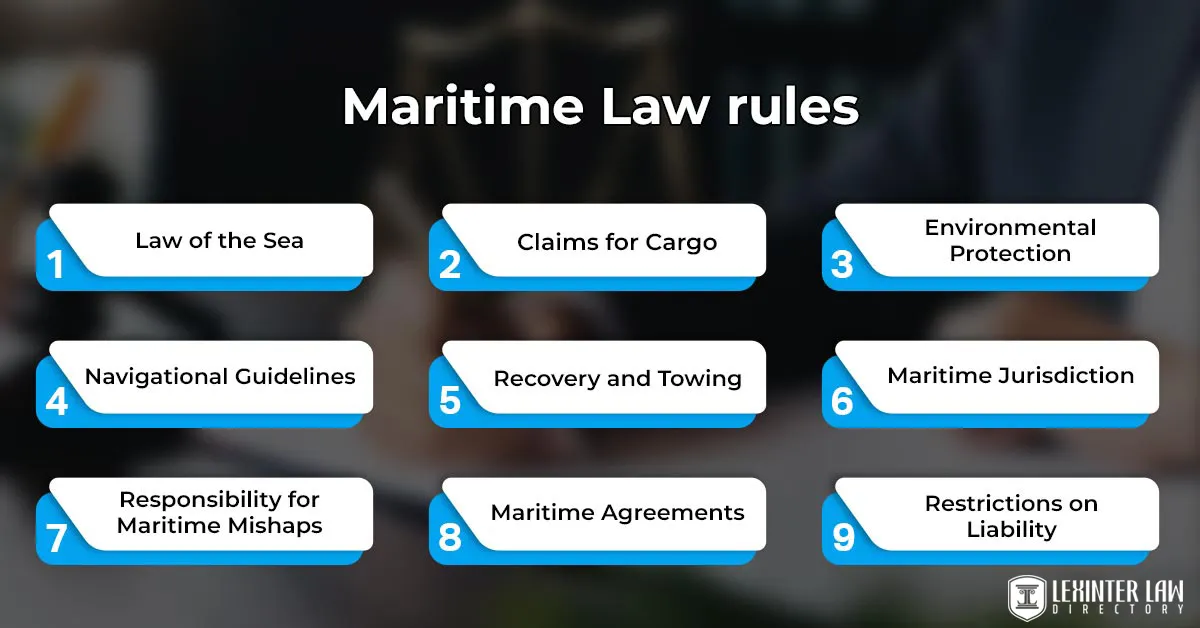General Information About Maritime Law
Maritime law, often referred to as admiralty law, governs activities and issues related to navigable waters, including oceans, seas, and rivers. It is a complex legal framework that encompasses a wide range of matters, from commercial transactions to environmental protection. In this article, we’ll explore the fundamental aspects of maritime law, its principles, key areas, challenges, and the role it plays in the global maritime industry.
Introduction to Maritime Law
Definition of Maritime Law Maritime law is a body of laws, conventions, and regulations that govern activities and issues involving navigable waters, including shipping, trade, commerce, and marine environmental protection.
Historical Significance Maritime law has ancient roots, dating back to early civilizations that relied on maritime trade and navigation. Over time, it has evolved to address the complexities of modern maritime activities.
Scope of Maritime Law Maritime law covers a wide range of legal issues, including admiralty and maritime litigation, maritime contracts and transactions, maritime insurance, salvage operations, and environmental regulations.
Principles of Maritime Law
Jurisdictional Aspects Maritime law involves complex jurisdictional issues, as maritime activities often span multiple jurisdictions, including international waters and territorial waters of different countries.
Application of International Conventions International conventions and treaties play a significant role in maritime law, providing a framework for resolving disputes, regulating shipping activities, and promoting safety and environmental protection.
Unique Legal Concepts Maritime law incorporates unique legal concepts, such as the doctrine of general average, salvage law, limitation of liability, and maritime liens, which govern rights and obligations in maritime transactions and disputes.
Key Areas of Maritime Law
Admiralty and Maritime Litigation Admiralty and maritime litigation involve legal disputes arising from maritime activities, such as vessel collisions, cargo damage, personal injury claims, and salvage operations.
Maritime Contracts and Transactions Maritime law governs contracts and transactions related to shipping and maritime commerce, including charter parties, bills of lading, ship sales, and financing agreements.
Maritime Insurance Maritime insurance covers risks associated with maritime activities, such as hull insurance, cargo insurance, protection and indemnity (P&I) insurance, and marine liability insurance.
Environmental Regulations With growing concerns about marine pollution and ecosystem degradation, maritime law includes regulations aimed at protecting the marine environment, regulating pollution discharge, and promoting sustainable maritime practices.
Importance of Maritime Law
Facilitating International Trade Maritime law plays a crucial role in facilitating international trade by providing legal frameworks for shipping, cargo transportation, and port operations.
Ensuring Safety and Security at Sea Maritime law promotes safety and security at sea through regulations governing vessel construction, navigation, crew training, and emergency response procedures.
Resolving Disputes Maritime law provides mechanisms for resolving disputes arising from maritime activities, including litigation, arbitration, mediation, and alternative dispute resolution methods.
Challenges in Maritime Law
Complexity of Jurisdiction The global nature of maritime activities poses challenges related to jurisdiction, enforcement of laws, and coordination among different legal systems.
Evolving Regulatory Landscape The maritime industry is subject to evolving regulatory requirements, including international conventions, regional agreements, and domestic laws, which can be complex and constantly changing.
Environmental Concerns Maritime law faces increasing pressure to address environmental concerns, such as pollution prevention, marine conservation, and climate change mitigation, while balancing economic interests and sustainability goals.
Role of Maritime Law Firms
Legal Representation and Counsel Maritime law firms provide legal representation and counsel to clients involved in maritime disputes, transactions, and regulatory matters, offering expertise in admiralty and maritime law.
Transactional Support Maritime law firms assist clients in negotiating and drafting maritime contracts, financing agreements, insurance policies, and other legal documents related to maritime transactions.
Regulatory Compliance Maritime law firms help clients navigate complex regulatory frameworks, ensuring compliance with international conventions, domestic laws, and industry standards.
International Cooperation in Maritime Law
United Nations Convention on the Law of the Sea (UNCLOS) UNCLOS is a comprehensive international treaty that sets out the rights and responsibilities of states in the use and management of the world’s oceans and marine resources.
International Maritime Organization (IMO) IMO is a specialized agency of the United Nations responsible for regulating shipping and promoting maritime safety, security, and environmental protection through international standards and conventions.
Bilateral and Multilateral Agreements Countries often enter into bilateral and multilateral agreements to address specific maritime issues, such as maritime boundaries, joint development zones, and cooperative enforcement efforts.
Recent Developments in Maritime Law
Digitalization and Automation Advancements in technology are reshaping the maritime industry, with digital tools, automation, and data analytics transforming shipping operations, regulatory compliance, and legal practices.
Sustainability Initiatives There is growing emphasis on sustainability in the maritime sector, with initiatives focused on reducing carbon emissions, promoting eco-friendly shipping practices, and protecting marine ecosystems.
Emerging Legal Trends New legal trends are emerging in maritime law, including increased focus on cybersecurity, data protection, and autonomous shipping, reflecting the evolving nature of maritime activities and risks.
Future Outlook of Maritime Law
Technological Advancements The future of maritime law is likely to be influenced by further advancements in technology, such as artificial intelligence, blockchain, and autonomous vessels, which will impact legal practices, regulatory compliance, and dispute resolution.
Environmental Sustainability The maritime industry is expected to continue its transition towards greater environmental sustainability, with regulatory frameworks and industry practices evolving to address climate change, pollution prevention, and marine conservation.
Legal Innovation As the maritime industry evolves, legal innovation will play a crucial role in addressing emerging challenges, promoting efficiency, and ensuring the effectiveness of legal frameworks in regulating maritime activities and protecting maritime interests.
Conclusion
Maritime law is a dynamic and multifaceted legal field that governs activities and issues related to navigable waters. From regulating shipping operations to resolving disputes and promoting environmental protection, maritime law plays a vital role in ensuring the safety, security, and sustainability of the global maritime industry. As the industry continues to evolve, maritime law will adapt to address emerging challenges, embrace technological advancements, and promote innovation in legal practices and regulatory frameworks.
FAQs
1. What is the difference between maritime law and admiralty law? Maritime law and admiralty law are often used interchangeably and refer to the same body of laws governing activities and issues related to navigable waters. Admiralty law historically referred to laws governing maritime activities at sea, while maritime law encompasses a broader range of legal matters, including shipping, commerce, and marine environmental protection.
2. How does maritime law impact international trade? Maritime law provides legal frameworks for shipping, cargo transportation, and port operations, facilitating international trade by ensuring the smooth flow of goods and commodities across borders.
3. What are some common legal issues handled by maritime law firms? Maritime law firms handle a wide range of legal issues, including admiralty and maritime litigation, maritime contracts and transactions, maritime insurance, salvage operations, and environmental regulations.
4. How do international conventions and treaties influence maritime law? International conventions and treaties play a significant role in shaping maritime law by providing a framework for resolving disputes, regulating shipping activities, and promoting safety, security, and environmental protection at sea.
5. What are some emerging trends in maritime law? Emerging trends in maritime law include digitalization and automation, sustainability initiatives, and legal innovation, reflecting the evolving nature of maritime activities and the need to address emerging challenges such as climate change, pollution prevention, and marine conservation.


